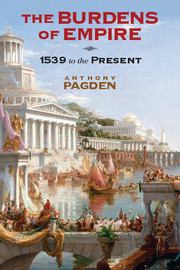Book contents
- Frontmatter
- Dedication
- Contents
- Preface
- Acknowledgements
- Introduction: Anatomy of Empire from Rome to Washington
- 1 Defending Empire: The School of Salamanca and the ‘Affair of the Indies’
- 2 ‘Making Barbarians into Gentle Peoples’: Alberico Gentili on the Legitimacy of Empire
- 3 The Peopling of the New World: Ethnos, Race, and Empire in the Early-Modern World
- 4 Conquest, Settlement, Purchase, and Concession: Justifying the English Occupation of the Americas
- 5 Occupying the Ocean: Hugo Grotius and Serafim de Freitas on the Rights of Discovery and Occupation
- 6 Cambiar su ser: Reform to Revolution in the Political Imaginary of the Ibero-American World
- 7 From the “Right of Nations” to the “Cosmopolitan Right”: Immanuel Kant's Law of Continuity and the Limits of Empire
- 8 “Savage Impulse-Civilized Calculation”: Conquest, Commerce, and the Enlightenment Critique of Empire
- 9 Human Rights, Natural Rights, and Europe's Imperial Legacy
- Bibliography
- Index
9 - Human Rights, Natural Rights, and Europe's Imperial Legacy
Published online by Cambridge University Press: 05 March 2015
- Frontmatter
- Dedication
- Contents
- Preface
- Acknowledgements
- Introduction: Anatomy of Empire from Rome to Washington
- 1 Defending Empire: The School of Salamanca and the ‘Affair of the Indies’
- 2 ‘Making Barbarians into Gentle Peoples’: Alberico Gentili on the Legitimacy of Empire
- 3 The Peopling of the New World: Ethnos, Race, and Empire in the Early-Modern World
- 4 Conquest, Settlement, Purchase, and Concession: Justifying the English Occupation of the Americas
- 5 Occupying the Ocean: Hugo Grotius and Serafim de Freitas on the Rights of Discovery and Occupation
- 6 Cambiar su ser: Reform to Revolution in the Political Imaginary of the Ibero-American World
- 7 From the “Right of Nations” to the “Cosmopolitan Right”: Immanuel Kant's Law of Continuity and the Limits of Empire
- 8 “Savage Impulse-Civilized Calculation”: Conquest, Commerce, and the Enlightenment Critique of Empire
- 9 Human Rights, Natural Rights, and Europe's Imperial Legacy
- Bibliography
- Index
Summary
You have theories enough concerning the rights of men; it may not be amiss to add a small degree of attention to their nature and disposition. It is with men in the concrete; it is with the common human life, and human actions, that you are to be concerned.
Edmund Burke to Charles-Jean François DepontI
In 1947, the Saudi Arabian delegation to the committee responsible for drafting the Universal Declaration of Human Rights protested that the committee had “for the most part taken into consideration only the standards recognized by Western civilization” and that it was not the task of the delegation “to proclaim the superiority of one civilization over all others or to establish uniform standards for all the countries of the world”. (One might wonder what interpretation they had originally given to the word “universal”.) Unsurprisingly their main objections were to Article 16, which guarantees women the freedom to choose their marriage partners, and to Article 18, which guarantees freedom of religion; but their opposition reflected a wider Islamic unease with the very conception of a “human” right.
In 1990, this rejection of what was viewed as an excessively Eurocentric conception of both the “human” and of “rights” led to the Cairo Declaration of Human Rights in Islam. This was subsequently joined by appeals on the part of Asian autocrats, and in particular Singapore's Lee Kuan Yew, for the recognition of the existence of a specific set of “Asian Values”, which supposedly place the good of the community over those of individuals and thus dispenses with the need for any kind of rights whatsoever. “Human rights” have also been denounced from within the Western academic establishment as overly dependent on a narrow, largely French, British, and American rights tradition. Until very recently, and still in some Utramontane quarters, the Catholic Church – if not individual Catholics – has also been a source of fierce opposition to what it saw as the triumph of lay individualism over the values of the Christian community.
- Type
- Chapter
- Information
- The Burdens of Empire1539 to the Present, pp. 243 - 262Publisher: Cambridge University PressPrint publication year: 2015



